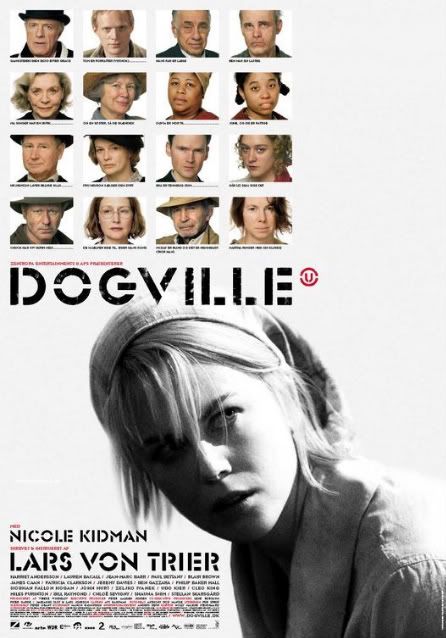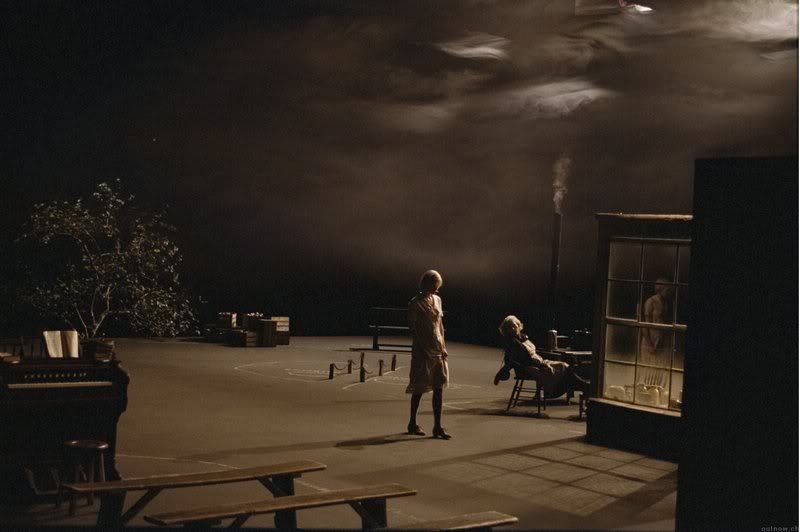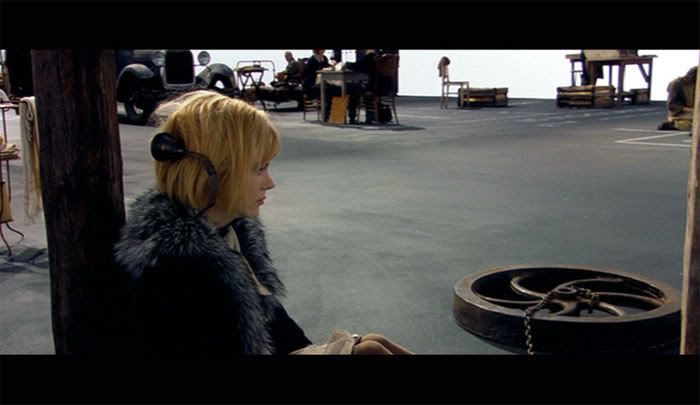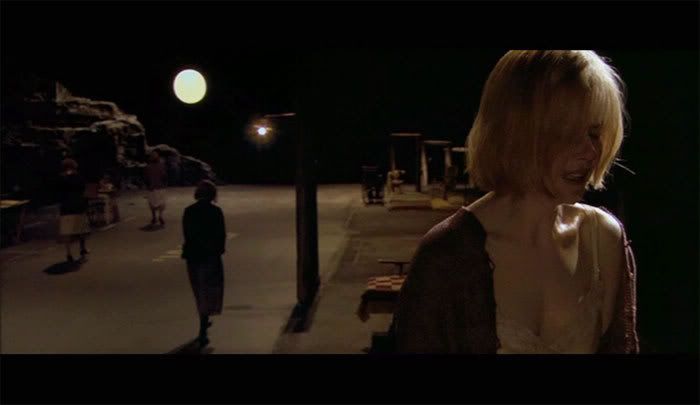Dogville is not a film that I find it easy to review; and those who find themselves averse to viewing films that so honestly depict human suffering would do best not to view this film. I still feel that it is essential that we expose ourselves to films of this nature. For it is in this that we can uncover the truth behind the human condition.
Dogville tells the story of the small town of Dogville, a quaint little place hidden away in the Rocky Mountains. The film is set during the time of the Great Depression, ironically enough. We are introduced to all sixteen residents of the town. The main character focused on is Tom Edison. He is a writer of sorts, interested in philosophy, who wishes to help the town understand their lack of acceptance towards outsiders. He holds weekly lectures addressing this issue, but they aren't met with thundering applause.
It is then that Tom meets Grace. Late one night she wanders into town, claiming that she is being chased by men who want to kill her. Tom agrees that she may stay for a night in the towns mine. Through this chance meeting Tom sees his opportunity to teach the town his lesson through example; Grace being that example. Even though many oppose, Tom convinces the town to allow her to take shelter in Dogville for two weeks; if Grace is unable to win the entire town over in two weeks she promises to leave.
However, things don't go over as well as Tom hopes, as the truth of who the residents of Dogville are come to an abrasive front and in the end, Dogville will regret that it ever "bared it's teeth".
What makes Dogville interesting is the way in which the story is told. It is not shot on location. Instead it is filmed on a sound stage. White lines are drawn to represent the various buildings, props are placed inside these lines to create an illusion, and various pieces of fake scenery are placed on the stage to make it seem as though this all takes place in a mountain town. The lighting is very artificial, but utilized very effectively to mark changes in weather or times of day.
The second part of the film which is even more interesting is the abrupt change in tone. For its first half, Dogville is cheery and light - though not without a slight sense of mystery- as if we're being told the wonderful love story between Grace and Tom; and as if we're going to be shown how Grace changes the town of Dogville for the better, like a re-telling of Polyanna.
This, however, is not the case. As the film glides into the second half, things get increasingly darker. As the mystery surrounding Grace heightens, so does the hostility towards her (from the townsfolk). Grace, who selflessly puts herself to hard work in order to earn her keep, becomes an object of torture from the residents, both mentally and physically.
The most disturbing aspect of the film is the ways in which the men of Dogville begin to take advantage of her. It's heartbreaking because of who Grace is. She's an incredibly fleshed out and three-dimensional woman. Her name describes her personality. She is kindness, grace and purity embodied. She is innocence. Little by little, this is stripped away from her. After she tries desperately to escape, she is betrayed and the townsfolk resort to chaining her up. The epitome of Grace's dehumanization.
The films technical side is faultless. The film is shot so that it's as if everything taking place is a grand play, that we're right in the middle of. Most of the time the camera is handheld and placed right in the middle of the action on screen. More often than not, during conversation, the camera will swing from one character to the next, giving off the illusion that we're there with them, listening to the exchange first hand. It's this involvement that gives the film such emotional power. Von Trier isn't afraid to hit us (and Grace) with all the devastation he's got.
The acting is spot on, and it needs to be due to the minimal amount of scenery there is to look at. In order to remain involved, the characters to needed to be portrayed well, and they were. Nicole Kidman was the shining star of the entire cast, though the supporting actors held their own. The film's writing is also spot on, the narration sounding as if it came out of a classic piece of literature.
Many have stated that the film is harshly anti-American, I would have to say that I don't believe the films views are that narrow. Cynical as it may be, the themes are relevant. What is man's true nature? How would that look if all the artificial areas of who we are were taken away and our nuances exposed? How would it affect those around us?
The films most important theme? None of us deserve to live. When Grace is forced to place herself in the shoes of the residents of Dogville, she realizes that there is nothing to justify the way they treated her. She realizes that none of them deserve life. It's a harsh realization that goes against everything Grace represents, but one that she is unable to deny.
This is the part where the film lacks. It lacks God. God is the ultimate grace, and because of him we can live, despite anything we may have done. The films view is true, but it didn't take into account the one factor that could have changed it all.
Though Dogville does lack this element, that doesn't negate it in any way. It's a powerful portrayal of man's anamilistic nature, stunning in it's characterization of Grace's loss of innocence, and an all too relevant criticism of our society's lack of forgiveness and tolerance. Close-mindedness. Something I've come to despise over these past few months. Dogville was a film I needed to see, and although I don't recommend it to you, it epitomizes everything cinema, and art in general, should be.
"And all of a sudden she knew the answer to her question all too well. If she had acted like them she could not have defended a single one of her actions and could not have condemned them harshly enough. It was as if her sorrow and pain finally assumed their rightful place. No. What they had done was not good enough. And if one had the power to put it to right it was one's duty to do so - for the sake of other towns, for the sake of humanity. And not least for the sake of the human being that was grace herself. "





No comments:
Post a Comment